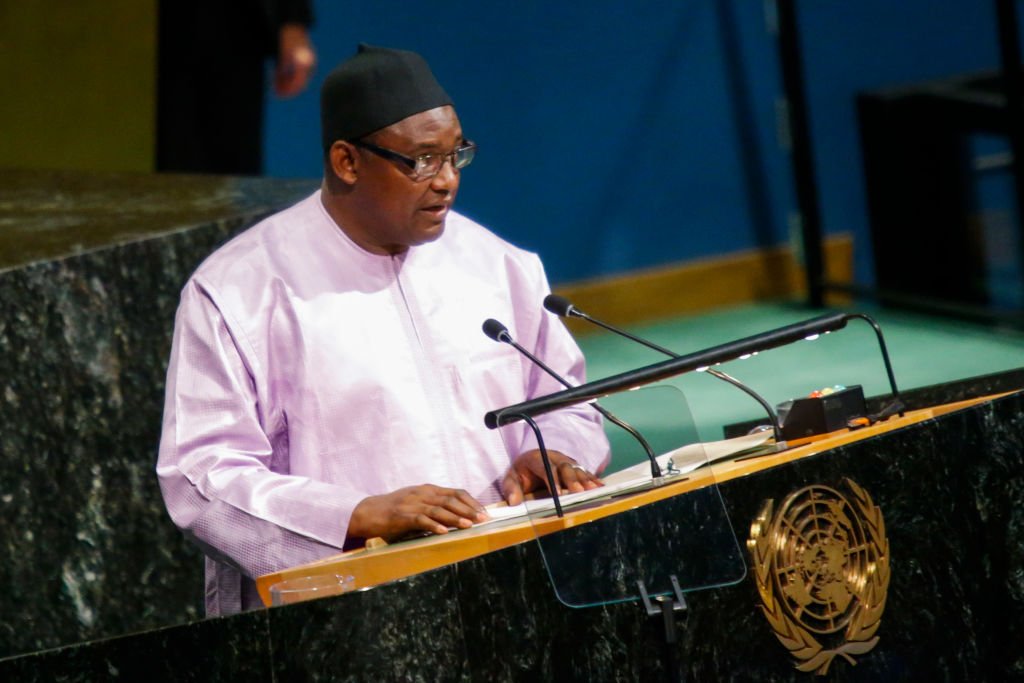#TheGambia: Charges of "false information and broadcasting” brought against #HRD Madi Jobarteh. The charges relate to a media interview he gave during a #BlackLivesMatter demonstration he organised on 27 June in #Serrekunda.
— Front Line Defenders (@FrontLineHRD) July 3, 2020
Our appeal:https://t.co/IoRUNLIVXm
Association & Peaceful Assembly
Country representative of the Westminster Foundation for Democracy Madi Jobarteh was summoned for questioning on 30th June to the Kairaba police station in Serrekunda, in relation to statements he made in an interview during a Black Lives Matter protest he organised on 27th June 2020 in front of the US embassy. That same day, Jobarteh was charged with 'false information and broadcasting' under the Criminal Code, which is punishable with a prison sentence of six months to five years or a fine of 500 to 50,000 dalasis (9.6 to 960 USD), before being released on bail. During the interview, Jobarteh said that the government failed to act and investigate the killings of Gambian citizens Haruna Jatta, Ousman Darboe and Kebba Secka, reportedly by Gambian police officers.
The arbitrary detention of and charges against the civil society activist caused an outcry among civil society actors. Fatou Jagne Senghore of freedom of expression CSO Article 19 West Africa commented:
"These controversial legal provisions were used by the old regime to silence opposition and crack down on dissident voices. In the new Gambia, human rights defenders and journalists should no longer be arrested for exercising their right to freedom of expression and sharing publicly their opinions on a matter of public interest."
On 10th July 2020, the charges against Jobarteh were dropped after a meeting between the Gambia Police Force, the National Human Rights Commission (NHRC), the Gambia Bar Association and the Association of Non-Governmental Organisations (TANGO).
The Black Lives Matter protest was initially planned for 8th June 2020, but authorities 'temporarily banned' the protest, using the grounds of restrictions on peaceful assembly in the context of the COVID-19 pandemic and the state of emergency. On 8th June 2020, the group delivered a petition to the US embassy in Banjul. Authorities eventually granted a permit for the protest to take place on 27th June 2020. The protest follows the fatal shooting of Gambian national Momodou Lamin Sisay in Georgia, USA, by police officers.
#Gambia The support has been overwhelming and we appreciate everyone's effort. It's not over yet, let's push together for the bill to be passed. Tomorrow the National Assembly would continue from where they stopped last week. The #ATIBill would be read clause by clause by NAMs. pic.twitter.com/OqYaAcK0kK
— Gambia Press Union (@gmpressunion) July 13, 2020
Expression
Access to Information (ATI) Bill tabled at the National Assembly
At the end of June 2020, the draft ATI Bill was finally tabled for consideration by the Members of the National Assembly. Previously, in December 2019, the Minister of Justice presented the Bill to the National Assembly, and it has since been subject to a number of reviews, including by the National Assembly Select Committee on Education, Training & ICT, whose report on the Bill was adopted by the National Assembly on 25th June 2020.
The Gambia Press Union (GPU) initiated the process of developing the ATI Bill in 2016, supported by civil society organisations.
Journalist briefly detained for covering COVID-19 protests
Editor and camera operator Ebou N. Keita for the broadcaster Gambian Talents Television was reportedly detained by police officers on 21st June 2020 in Kombo district while he was photographing and taking videos of police officers arresting drivers protesting the restrictions in the context of the COVID-19 pandemic lockdown. The Committee to Protect Journalists (CPJ), who spoke with the journalist and the founder of the television station, said that police officers stopped him, took his phone and tied his hands with an elastic cord before they took Keita to the police station in Abuko. As colleagues came to his assistance, the journalist was reportedly transferred twice to other police stations and was eventually released without charge about six hours after his detention.
Gambian National Assembly approves bill to support media outlets
For the first time since 1965, Gambian authorities granted financial assistance for media outlets, said Reporters without Borders (RSF). On 17th July 2020, the Gambian National Assembly approved a bill granting a subsidy of 15 million dalasi (300,000 USD) to print media outlets and radio stations, while a separate bill is under preparation for broadcast media. Assane Diagne of RSF commented:
This historic decision is all the more important for coming at a time when the media are facing an unprecedented financial crisis exacerbated by the Covid-19 pandemic. However, this measure must not divert attention from the other challenges that still need to be addressed in order to create a more favourable environment for journalistic freedom in a country marked by a 20-year dictatorship.”
Among challenges still to be addressed are the repeal of restrictive laws that were adopted under the dictatorship of Yahya Jammeh, such as laws on fake news and criminal defamation, and the violent behaviour of security forces towards journalists, which still occurs regularly, says RSF.
